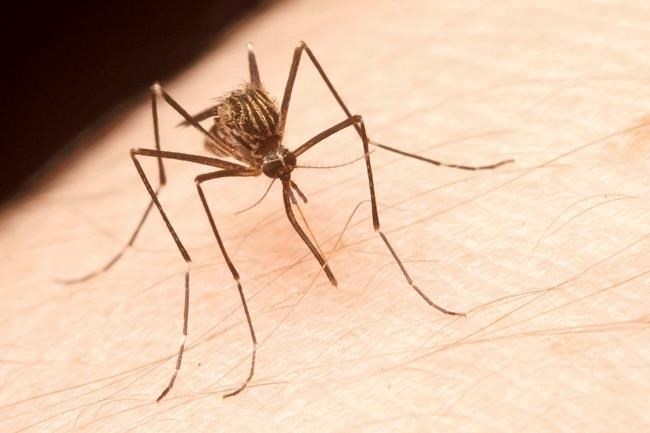
FILE PHOTO
Image Credit: THE CANADIAN PRESS/HO-Sean McCann
March 17, 2017 - 12:30 PM
Since 1974, the Regional District of Okanagan-Similkameen (RDOS) Nuisance Mosquito Control Program typically runs between mid-May into late August. For the past several years, the program has been starting in April due to weather conditions and resident complaints.
Each week, the RDOS Mosquito Control Crew tests standing water at identified sites for the presence of mosquito larvae. If the site requires treatment, a granular bacterial larvicide is broadcast into the water. The natural bacteria pellets kill the mosquito and biting black fly at their larval stage. The adult mosquitos are not affected by the larvicide and the product has shown not to harm any other insects, amphibians, reptiles, fish, birds or mammals.
This year, the RDOS mailed Permission to Treat letters to residents on the program in advance of the mosquito season. This is to maximize the crew’s efficiency once the season gets underway. If you reside in the RDOS Electoral Areas or municipalities listed below and have areas of standing water bodies too large to drain on your own, or have areas previously treated and have not received a letter, please contact Zoe Kirk, Public Works Project Coordinator at the number or email below.
Program coverage:
Electoral Areas: “A”,”B”, “C”, “D”, “F”, “G”, and “H” as well as the City of Penticton, District of Summerland, and Towns of Oliver and Osoyoos
Protect Yourself
At your home, be sure to mend screens and reduce sources of standing water on your property. Clean and unclog eaves-troughs and gutters and remove water from any depressions on your roof or driveway. Refresh pet dishes and birdbaths daily. Remove any standing water from items such as tires, pails, tarps, boats, hot tub and pool covers.
Look around your property for anything that can hold water (for 72 hours or more) as it will provide an excellent habitat for mosquitoes. Yard items such as storm water catch basins, ephemeral ponds, standing water in tires, plant pots, small troughs, pool covers, rain barrels, tarps, rain barrels and wading pools are all places that can harbour breeding mosquitos.
Zika Virus Concerns
At this time, the Zika Virus carrying mosquito has not been proven to survive in Canada, and concerns about transmission are focused on Canadians that have travelled to countries affected and human to human transfer. However, the National Microbiology Laboratory in Winnipeg is continuing its research to determine if it is at all possible that North American insects could become infected with Zika and potentially transmit the virus.
FYI contains information submitted from the public and is displayed exactly as it was received. Information is clearly attributed in bylines and not created by iNFOnews.ca staff. For more information, please contact the referring organization. If you have questions about FYI, or would like to submit information to FYI, please send directly to fyi@infonews.ca.
News from © iNFOnews, 2017